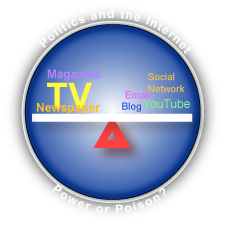Digital social networks are transforming every field of human endeavor because they change the economics of how people discover, develop and maintain relationships. Therefore, social networks propose a revolution in communication is similar in scope to Ford’s invention of the assembly line for fabrication but executives don’t understand it. This post […]
|
|||||
|
August 29th, 2009 | Tags: CEO, CMO, Culture, Economics, Human capital, Model, Relationship, Strategy, Technology, Transform, Trust, Virtual world | Category: Social Business | 10 comments Why 2009’s economic disruption will prove more pervasive and protracted than many experts think—and how you can guide you company. Guidance on using social networks to become more competitive and enhance your survival. […] July 26th, 2009 | Tags: CEO, Empowerment, Experience, Government, Human capital, Innovation, Knowledge Economy, Manufacturing & Transport, Politics, Transform | Category: Economy | 2 comments Job search in a disruptive environment, and how to use social networking to create the advantage […] July 26th, 2009 | Tags: Advice, Blogs, Career, Executive, Human resources, Job search, LinkedIn, Management, Opportunity, Strategy, Tactic, Transform | Category: Social Platforms | Leave a comment Reflections on the collapse of Chicago’s legacy publishing economy: Britannica, Encarta, Wikipedia, Chicago Tribune, Chicago Sun-Times […] July 19th, 2009 | Tags: Knowledge Economy, Media, Noodle, Publishing, Transform, Web 2.0 | Category: Economy | 2 comments Life cycle model for social networks provides a blueprint for investment, along with goals, activities and milestones for each stage. A plan of action for creating value from enterprise social networking initiatives. […] April 18th, 2009 | Tags: Adoption, B2B, Business, CEO, CIO CTO, CMO, Collaboration, Culture, Development, Empowerment, Enterprise 2.0, Experience, Human capital, Innovation, Knowledge Economy, Management, Marketing, Model, Relationship, Sales, SBS, Strategy, Technique, Transform, Trust, Web 2.0 | Category: Social Business | 9 comments This Web 2.0 adoption curve helps commercial and government executives make investments in social networks, social media and Web 2.0 in 2009 and 2010: use this realistic adoption model to manage expectations and risk. […] April 4th, 2009 | Tags: Adoption, CMO, Culture, Enterprise 2.0, Innovation, Internet, Strategy, Transform, Web 1.0, Web 2.0 | Category: Social Business | 5 comments Twitter and Facebook Top of Mind | #snc2009 | Awaiting Discovery: The Nascent Power of Weak Ties and Small Touches
Social Networking Watch’s Mark Brooks gave an overview of key trends, while jetBlue’s Morgan Johnston and IBM’s Adam Christensen drove home the message that companies could be rewarded for trusting their customers in social networks. Ford’s Scott Monty, Sun’s Lou Ordorica and Microsoft’s Marty Collins shared how they were […] January 27th, 2009 | Tags: Adoption, Case study, CEO, CIO CTO, CMO, Collaboration, Culture, Empowerment, Enterprise 2.0, Experience, Healthcare, Higher education, Human capital, Innovation, Internet, Knowledge Economy, Management, Marketing, Mobile, SNC, Strategy, Technology, Transform, Web 2.0 | Category: Healthcare, Social Business | One comment Volatility, Uncertainly and Opportunity—Move Crisply while Competitors Are in Disarray
This is a high-stakes year in which we can expect surprises. Web 2.0 and social networks can help because they increase flexibility and adaptiveness. Alas, those who succeed will have to challenge conventional thinking considerably, which is not a trivial exercise in normal times. The volatility that many businesses face will make it more difficult because many of their clients and/or employees will be distracted. It will also make it easier because some of them will perceive that extensive change is afoot, and Web 2.0 will blend in with the cacaphony. Disruption produces unusual changes in markets, and the people that perceive the new patterns and react appropriately emerge as new leaders. […] January 2nd, 2009 | Tags: Adoption, CEO, CIO CTO, CMO, Economics, Empowerment, Enterprise 2.0, Globalization, Government, Healthcare, Human capital, India, Innovation, Internet, Knowledge Economy, Management, Marketing, Politics, Prediction, Review, Strategy, Technology, Transform, Web 1.0 | Category: Social Business | 4 comments Editor’s Choice of the Global Human Capital Journal—Accelerating Disruption and Opportunity
Look in any direction. From a macroeconomic perspective, the global economy is showing itself to be pervasively interdependent. The U.S. successfully exported its real estate finance crisis without even working up a sweat. I don’t believe that anyone really knows where all the bodies are buried yet, and central bank chairmen, national presidents and global organization leaders are still holding their breaths, even though they smile bravely on television. Barack Obama’s successful U.S. presidential campaign showed that a new era of politics is upon us; as we’ll discuss below, […] December 31st, 2008 | Tags: Adoption, CEO, CIO CTO, CMO, Economics, Empowerment, Enterprise 2.0, Globalization, Government, Healthcare, Higher education, Human capital, India, Innovation, Internet, Knowledge Economy, Management, Marketing, Politics, Prediction, Review, Strategy, Technology, Transform, Web 1.0, Year in Review | Category: Social Business | One comment Conventional Wisdom Scuttled—Disruption Preview—Business in the Batter’s Box
The Obama campaign is very instructive to business leaders because business customers are changing expectations of their leaders, as we’ll discuss in more detail below. As the Global Human Capital Journal is not primarily focused on politics, I am less interested in the fact that Obama was elected than how he was elected. Moreover, […] December 29th, 2008 | Tags: Adoption, Case study, CEO, CIO CTO, CMO, Collaboration, Culture, Debunk, Economics, Empowerment, Experience, Government, Human capital, Internet, Knowledge Economy, Marketing, Mobile, Politics, Strategy, Technology, Transform | Category: Government, Social Business, Social Platforms, Society & Culture | 10 comments |
ThemesTopicsAdoption
Advice
Analysis
Career
Case study
CEO
CIO CTO
CMO
Collaboration
Community
Conference
Culture
Customer
Development
Economics
Employee
Empowerment
Enterprise
Enterprise 2.0
Executive
Experience
Facebook
Globalization
Government
Higher education
Howto
Human capital
Innovation
Internet
Knowledge Economy
LinkedIn
Management
Marketing
Mobile
News
Politics
Reflection
Relationship
Social network
Strategy
Technique
Technology
Transform
Trust
Twitter
Past Issues |
||||
|
Copyright © 2026 Christopher S. Rollyson and Associates - All Rights Reserved Powered by WordPress & Atahualpa |
|||||

 What a difference a year makes! The Social Networking Conference debuted several years ago as a forum for social networking sites and vendors, with enterprise clients few and far between. Miami 2009 took place January 22-23, 2009 at the Miami Beach Convention Center, and it was a veritable enterprise 2.0 conference. Many of the presenters hailed from enterprise-focused high technology vendors, but they spoke as social networking practitioners. The good practices they shared reflected the maturation of social networks. Don’t get me wrong, we are still in early days, but it was obvious to see that social networks would be completely mainstream this year. Enterprise-focused vendors provided additional evidence by explaining some of the new social network features in their offerings.
What a difference a year makes! The Social Networking Conference debuted several years ago as a forum for social networking sites and vendors, with enterprise clients few and far between. Miami 2009 took place January 22-23, 2009 at the Miami Beach Convention Center, and it was a veritable enterprise 2.0 conference. Many of the presenters hailed from enterprise-focused high technology vendors, but they spoke as social networking practitioners. The good practices they shared reflected the maturation of social networks. Don’t get me wrong, we are still in early days, but it was obvious to see that social networks would be completely mainstream this year. Enterprise-focused vendors provided additional evidence by explaining some of the new social network features in their offerings. Now that the Year in Review 2008 has summarized key trends, we are in excellent position for 2009 prognostications, so welcome to Part II. As all experienced executives know, risk and reward are inseparable twins, and periods of disruption elevate both, so you will have much more opportunity to produce uncommon value than normal.
Now that the Year in Review 2008 has summarized key trends, we are in excellent position for 2009 prognostications, so welcome to Part II. As all experienced executives know, risk and reward are inseparable twins, and periods of disruption elevate both, so you will have much more opportunity to produce uncommon value than normal. What a year! When I wrote in the 2007 Year in Review that 2008 “would produce an unimaginable degree of change,” I had no idea how right that would prove to be. We saw major disruption in the global economy, and the U.S. presidential campaign closed the year with a major political upset, largely at the hand of social media. That said, I still believe that 2008 will prove to be a transitional year and that more profound change is on the way.
What a year! When I wrote in the 2007 Year in Review that 2008 “would produce an unimaginable degree of change,” I had no idea how right that would prove to be. We saw major disruption in the global economy, and the U.S. presidential campaign closed the year with a major political upset, largely at the hand of social media. That said, I still believe that 2008 will prove to be a transitional year and that more profound change is on the way. Barack Obama’s presidential campaign was more than a major social media milestone because it ushered in a new relationship model among leaders and their supporters. Due to social media, an unprecedented number of individuals had a new kind of active, direct role in Obama’s campaign; moreover, I predict that the Obama campaign and imminent administration will change citizens’ and consumers’ expectations of “leader” and “follower” roles in government and business. Amazon.com changed consumers’ expectations about retail in general—information on demand, reviews, unbelievable variety at low prices—and a significant portion of Obama supporters will want to continue their support to “make the change happen.” These supporters will bring their changed expectations of action and collaboration to their vendors. That means your company.
Barack Obama’s presidential campaign was more than a major social media milestone because it ushered in a new relationship model among leaders and their supporters. Due to social media, an unprecedented number of individuals had a new kind of active, direct role in Obama’s campaign; moreover, I predict that the Obama campaign and imminent administration will change citizens’ and consumers’ expectations of “leader” and “follower” roles in government and business. Amazon.com changed consumers’ expectations about retail in general—information on demand, reviews, unbelievable variety at low prices—and a significant portion of Obama supporters will want to continue their support to “make the change happen.” These supporters will bring their changed expectations of action and collaboration to their vendors. That means your company.